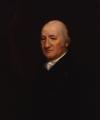To Psaumis of Camarina, on his Victory in the Chariot Race. ARGUMENT. The Poet, after an invocation to Jupiter, extols Psaumis for his Victory in the Chariot Race, and for his desire to honor his country. From thence he takes occasion to praise him for his skill in managing horses, his hospitality, and his love of peace; and, mentioning the history of Erginus, excuses the early whiteness of his hair.
STROPHE.
Great Jove! supreme immortal King!
Borne on the unwearied thunder's wing;
Again thy hours that roll along
Responsive to the varied song,
Awake my Lyre, and send me forth
A witness of heroic worth.
The Virtuous in a Friend's success rejoice,
And join the applauding Herald's chearful voice.
O son of Saturn! who on Ætna's brow,
The woody load of Typhon's giant breast,
Holdest thy high abode; the Graces now
Invite thee to assist the Strain, address'd
To greet the Victor in the Olympic strife;
Of every virtuous deed, the lustre, and the life.
ANTISTROPHE.
On his proud Car triumphant placed,
His brows with Pisa's Olive graced,
Lo Psaumis comes! the Shores around
Fair Camarina's Praise resound;
For to his own illustrious name
The Patriot joins his Country's Fame.
O may the immortal Gods propitious hear
His future vows, and grant each pious prayer!
Well is he skill'd to train the generous Steed,
Fair Plenty crowns his hospitable gate,
With breast sincere he courts the placid meed
Of smiling Peace, best Guardian of the State.
No hues fallacious tinge my honest lay,
Experience to the world will every truth display.
EPODE.
This from the Lemnian Dames' disgrace
Freed Clymenus' victorious son,
When, clad in brazen arms, the race
With active limbs the Hero won,
And, taking from Hypsipyle the Crown,
He thus the royal Maid address'd:
Behold the Man! nor great in speed alone!
My hand unvanquish'd, undismay'd my breast.
These Silver Tresses, lo! are spread
Untimely, on a youthful Head;
For oft capricious Nature's Rage
Gives to the vigorous Brow, the hoary Tint of Age.






